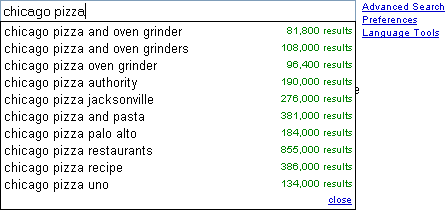Search Without SERPs: The Future of SEO?
September 9, 2008 — By Dr. PeteYesterday was Google's 10th anniversary, and I thought it would be a good time to write about something I've been thinking about a lot lately: the humble SERP. Even as Google reinvented how pages were ranked and changed the SEO game forever, the search engine results page (SERP) remained virtually the same. Consider this search result from Lycos, circa 1996 (courtesy of the Internet Archive):

Looks pretty familiar, doesn't it? It's only been the past couple of years where we've begun to see the evolution of the SERPs, an evolution which seems to recently be accelerating. Even putting aside advertising, such as Google's mind-bogglingly profitable AdWords program, search results have started to become customized, personalized, segmented, and have even begun to leave the SERPs altogether.
Enhanced SERPS
This first step in this evolution was search enhancement, when search engines began to add customized features to the SERPs to supplement the basic text results. I'll briefy discuss two, Google OneBox and Google Suggest.Google OneBox
Back in 2006, Google started experimenting with the OneBox, an area at the top of the SERPs that contained customized information for certain kinds of queries, such as movie showtimes and stock quotes. Probably most notably, OneBox revolutionized the landscape for local search, providing integrated local business listings with Google Maps.

Pardon the large image, but it really serves to illustrate how much SERP real-estate the OneBox consumes and just how fundamentally it changed the game for searchers and search marketers in certain niches.
Google Suggest
Recently, Google rolled out Google Suggest, a pop-up menu that suggests alternative search queries while you type. For example, when I typed in "chicago pizza" on the Google home-page, I saw this:

While Google Suggest still seems like a work in progress, what's notable about it is that it potentially bypasses the first round of SERPs entirely, redirecting a searcher from one set of results to another without even seeing the original listings.
Search Without SERPs
Recent advancements go far beyond SERP enhancement, though. Lately, with technological advances in mobile devices and a resurgence in competition in the browser market, we're starting to see alternatives to the traditional search results.Mobile Maps - iPhone
I'm a recent iPhone convert - I'll spare you the gory details, but one selling point for me was the integration of GPS. The iPhone 3G comes with a customized Google Maps application with built-in search, but instead of traditional SERPs, you get something more akin to the OneBox map:

Unlike the OneBox, though, the traditional SERP is completely gone, replaced with an interactive map based on your current location. This is obviously useful to end-users, but it changes the game completely for local businesses. If your business isn't ranking for local searches, an iPhone user probably won't find it, even if you rank well on traditional SERPs.
Direct Queries - Ubiquity
Mozilla Labs, creators of the Firefox browser, recently released Ubiquity, a tool for entering simple, customized text queries. For instance, if I call up the Ubiquity plug-in and type "map chicago pizza", I get a search preview:

Once again, results seem to be pulling from the Google Maps/OneBox data, but just as with the iPhone map, Ubiquity has completely circumvented the traditional SERPs.
Implications for SEO
As search marketers, it's hard not to be a little worried by these recent changes - as a group, these advancements are undeniably game-changers and represent a significant learning curve. The important thing to remember, though, is that this evolution is not only good for users, it can be good for clients if we're willing to adapt. SEO is a young field that is destined to break into niches and specialties, and how you best guide searchers to information will depend more and more on your clients and target industries.Update (Sept. 10): On a similar topic, interesting post from Aaron Wall at SEOBook about how Google Chrome may change SEO. Google's new browser includes the Omnibox, which bypasses SERPs, in some cases.
Home | Who is Dr. Pete? | Are You A Real Doctor? | Can I Hire You? | Archive
©2026 User Effect, LLC.
